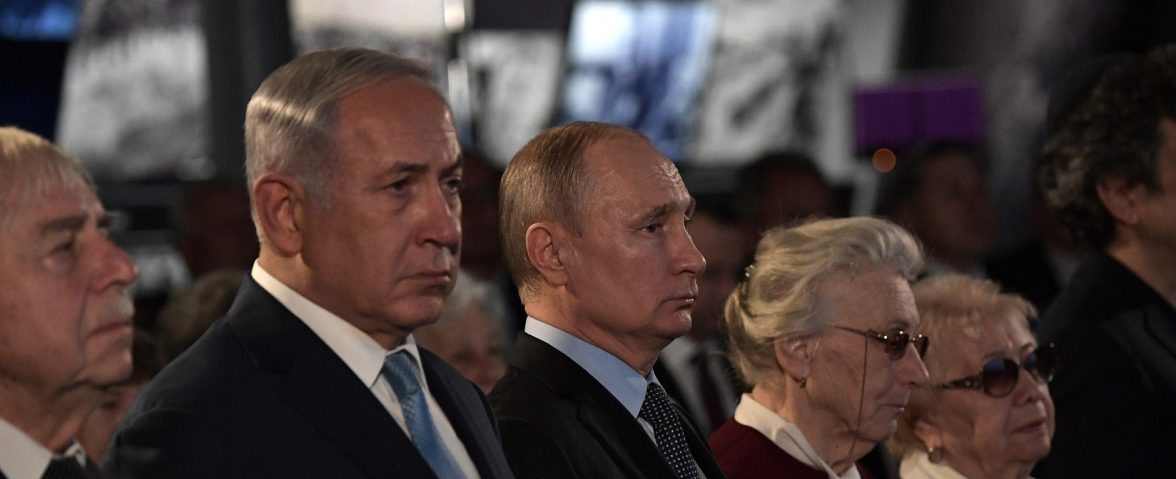Alexey Khlebnikov discusses Moscow’s role in the ongoing standoff between Iran and Israel in Syria with Michael Young.
Michael Young: Describe the role Russia is playing today in trying to head off an Israeli-Iranian confrontation in Syria.
Alexey Khlebnikov: First, it is important to remember that both countries, Israel and Iran, are important to Russia and Moscow always tries to avoid major escalations or direct military confrontations between two countries with which it is close. The second crucial thing to bear in mind is that the interests of the two are contradictory. Israeli security depends on a decreased Iranian presence in Syria, while Tehran’s influence in the Middle East is closely connected to its enhanced position in Syria and Lebanon, which means hitting up against Israeli interests.
This very context leaves Moscow with no good options in its dealings with the Israelis and Iranians. On the one hand, Russia’s success in Syria has occurred thanks to collaboration with Iran. Moscow needs Iranian forces on the ground there and it cannot afford to alienate Tehran. Without Iran Russian actions in Syria would become even more problematical, if they do not fail altogether. On the other hand, Moscow doesn’t want to spoil its ties with Israel, which is also an important partner in many spheres.
Economically, Israel is Russia’s fourth largest trading partner in the region, with a turnover of $2.5 billion in 2017, which exceeds that with Iran at $1.7 billion. Russia and Israel have established close and effective cooperation in the military, intelligence, and security spheres. When Russia deployed its military to Syria, it immediately established a coordination channel with Israel to avoid any incidents. This channel has functioned flawlessly so far. Another important factor is that Israel acts as an additional channel of communication between the United States and Russia, one that understands Russian concerns in the region.
MY: Where might we see Russian-Israeli divergences arise?
AK: Russia is trying to sit on two chairs, which can be tricky. It needs to be in constant contact with Israel and Iran and look for compromises. In the end, Russia can’t allow Israel to initiate a direct military confrontation with Iran, as this would negatively affect Moscow’s calculations in Syria, while Israel can’t accept the unlimited growth of Iranian influence in Syria, as this threatens its own national security. Moscow has to take into account both Israel’s and Iran’s security concerns, and these are mutually exclusive.
This raises a question: To what lengths are Russia and Israel ready to pursue their current interests in Syria? So far, they have managed to compromise, but there is no guarantee that this will be the case forever.
MY: Russian-Iranian differences over Syria have often been overstated, yet today they seem real. Where do Moscow and Tehran differ?
AK: Both countries already do not see eye to eye on a number of key issues, including the fate of President Bashar al-Assad, postwar political reforms, the role of the Kurds, cooperation with the United States, the extent of their postwar military presence and influence in Syria, and so on. Yet Russia has found itself in a situation where it cannot really control Iranian actions in Syria, contrary to the belief of many. While Moscow has tried to increase pressure on its allies to allow for more compromise, Damascus and Tehran can easily sabotage any initiative or plan proposed by Russia that doesn’t suit their interests. They have already done so previously on numerous occasions, especially with regard to the deescalation zones and a political process in Syria. It will be difficult, therefore, for Moscow to reach an agreement with its allies. As a result, the Kremlin will need extra leverage to exert more pressure to move a political process forward.
Assad’s latest snap visit to Sochi on May 17 showed that this might be happening. As a result of the meeting, Assad agreed to send Syrian governmental representatives to Geneva to take part in the work of the Constitutional Committee to draft Syria’s new constitution. It is quite an important change as previously, after the conference on Syria in Sochi earlier this year, Damascus had refused to accept participation in the Constitutional Committee. That was a slap to Moscow, but apparently the Kremlin applied pressure to get what it wanted. Moscow will continue increasing pressure on Assad. It needs results in Syria, which require concessions from Damascus, Ankara, Iran, and Russia itself.
MY: It was noticeable that Russia did not use its anti-aircraft missiles against Israeli aircraft during their recent attacks on Iranian targets in Syria. What was the message in this?
AK: In recent months Israel launched numerous attacks on Syrian and Iranian targets in Syria and Moscow turned a blind eye to them. This was a strong signal to Assad that Russia cannot and will not protect his military if the Iranians continue to expand their military presence in Syria. It also underlined that Russia takes Israeli security concerns into account.
So, the Russian moves are about making Damascus understand that it needs to keep the Iranians and their allies away from the border with Israel and not provoke Israeli attacks. In the end, the Russians are implying, Assad won’t benefit from an excessive Iranian presence and influence in Syria, as this will only lead to more pressure being exerted on Damascus, bringing further problems and complicating a political settlement.
Now, the common sense is the following: The stronger is Damascus, the less it will need an Iranian military presence in Syria. That said the most pressing question is whether Damascus understands this logic and whether the Iranians accept it.
Firsed published at carnegie-mec.org












